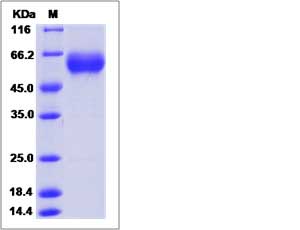Rhesus CD137 / 4-1BB Protein (Fc Tag)
CD137, 4-1BB
- 100ug (NPP2944) Please inquiry
| Catalog Number | P90847-K02H |
|---|---|
| Organism Species | Rhesus |
| Host | Human Cells |
| Synonyms | CD137, 4-1BB |
| Molecular Weight | The recombinant rhesus TNFRSF9 consists of 401 amino acids and predicts a molecular mass of 44 kDa. |
| predicted N | Leu 24 |
| SDS-PAGE |  |
| Purity | > 95 % as determined by SDS-PAGE. |
| Protein Construction | A DNA sequence encoding the rhesus TNFRSF9 (NP_001253057.1) (Met1-Gln186) was expressed with the Fc region of human IgG1 at the C-terminus. |
| Bio-activity | |
| Research Area | Cardiovascular |Angiogenesis |Cytokine & Receptor |Tumor Necrosis Factor & Receptor |TNF receptor |
| Formulation | Lyophilized from sterile PBS, pH 7.4. 1. Normally 5 % - 8 % trehalose, mannitol and 0.01% Tween80 are added as protectants before lyophilization. Specific concentrations are included in the hardcopy of COA. |
| Background | CD137 (also known as 4-1BB) is a surface co-stimulatory glycoprotein originally described as present on activated T lymphocytes, which belongs to the tumor necrosis factor (TNF) receptor superfamily. It is expressed mainly on activated CD4+ and CD8+ T cells, and binds to a high-affinity ligand (4-1BBL) expressed on several antigen-presenting cells such as macrophages and activated B cells. Upon ligand binding, 4-1BB is associated with the tumor necrosis factor receptor–associated factors (TRAFs), the adaptor protein which mediates downstream signaling events including the activation of NF-kappaB and cytokine production. 4-1BB signaling either by binding to 4-1BBL or by antibody ligation delivers signals for T-cell activation and growth, as well as monocyte proliferation and B-cell survival, and plays an important role in the amplification of T cell-mediated immune responses. In addition, CD137 and CD137L are expressed in different human primary tumor tissues, suggesting that they may influence the progression of tumors. Crosslinking of CD137 on activated T cells has shown promise in enhancing anti-tumor immune responses in murine models, and agonistic anti-CD137 antibodies are currently being tested in phase I clinical trials. |
| Reference |
